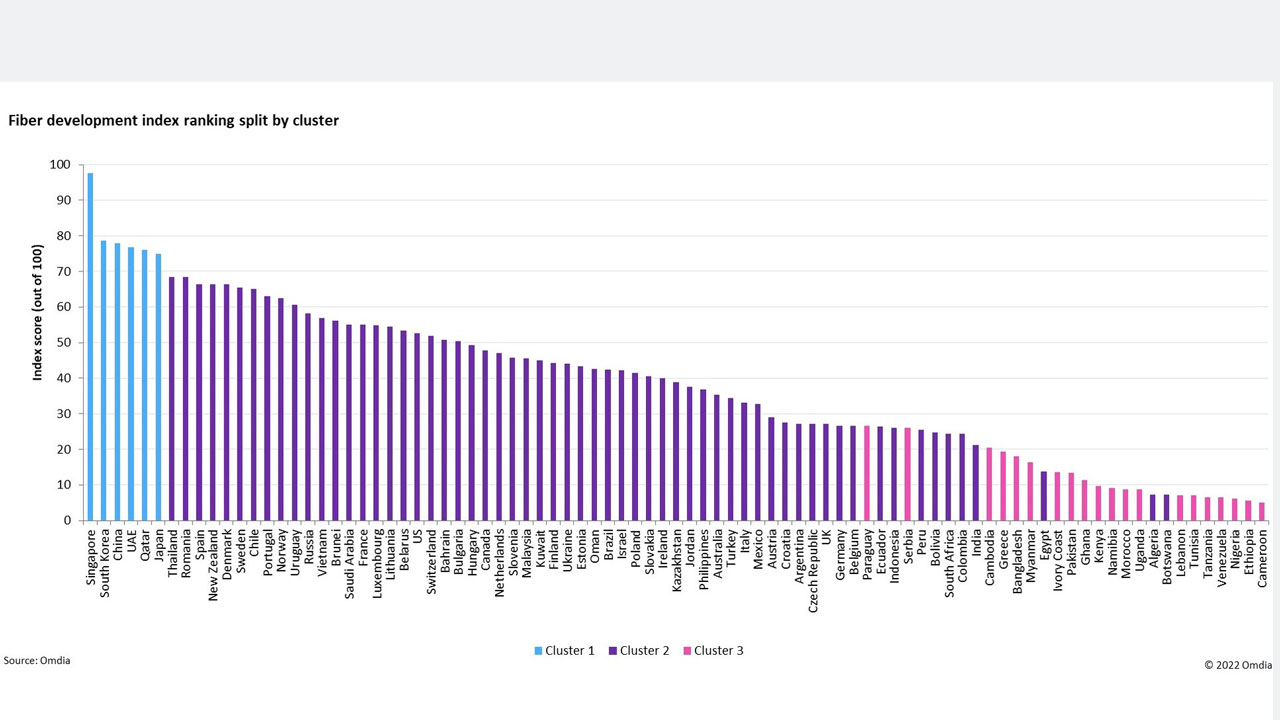 Among some 88 countries surveyed in terms of fibre optic deployment capacity, Nigeria ranks 85th.
Among some 88 countries surveyed in terms of fibre optic deployment capacity, Nigeria ranks 85th.
The survey, titled, ‘Global Fiber Development 2022 Index’, done by Omdia Research, looked at the fibre deployment status of the countries.
Omdia tracked 88 countries, which means Nigeria ranked very low in terms of fibre rollout.
The top five countries on the list were Singapore, South Korea, China, United Arab Emirates and Qatar. The United State ranked 25th, while the UK was 55th on the list.
African countries ranked the least with South Africa leading the continent at 64th position; Egypt ranked 71st; Ivory Coast 72, others are Ghana; Kenya; Namibia; Morocco; Uganda; Algeria; Bostwana; Tunisia; Tanzania; Nigeria; Ethiopia and Cameroun.
Omdia Research Director, Michael Philpott, said fiber investment is an essential metric for government institutions and other stakeholders to track.
“As a broadband-access technology, optical fiber provides an optimized, highly sustainable, and future-proof quality service. This superior level of quality is essential for the development of future digital services and applications across all verticals.
“With increased efficiency stimulating greater innovation, high-speed broadband has been proven to drive not just consumer satisfaction but national economic indicators such as GDP and productivity. Only by maximizing investment in next-generation access can countries optimize their growth potential, and fibre-optic technology is key to that investment.
In a related development, the Nigerian Communications Commission (NCC) has said the country requires investments in 120,000 additional kilometres of Fibre Optic Cables to meet the New National Broadband Plan (NNBP) 2025 target.
Not only that, the commission suggested that the country needs massive investments in about 40,000 additional Base Transceiver Stations (BTS) to ensure the plan does not become a mirage.
The Executive Commissioner (Stakeholders’ Management), NCC, Adeleke Adewolu, stated this, while delivering the keynote address at the Third Yearly Stakeholders Conference of Lagos State Infrastructure Maintenance and Regulatory Agency (LASIMRA), themed: “Transforming Lagos State into a Smart City Hub in Africa – The Government’s Infrastructure Approach”, held in Lagos.
Adewolu stated that the theme of the conference is very apt since the broadband infrastructure is the backbone of Smart Cities.
“The NCC and LASIMRA must inevitably engage and collaborate, but sometimes in disagreement, as Lagos State is the hub of telecoms and technology activities in Nigeria”, Adewolu stated.
The NCC Commissioner, however, urged the government at various levels to increase Internet capacity in the country due to its huge infrastructure deficit, saying “for instance, we need over 120,000 additional kilometres of Fibre Optic Cables from the current figure of fewer than 60,000 kilometres and about 40,000 additional Base Transceiver Stations (BTS) to meet the NNBP targets by the year 2025.” The current fibre deployment in Nigeria is above 50,000km.






